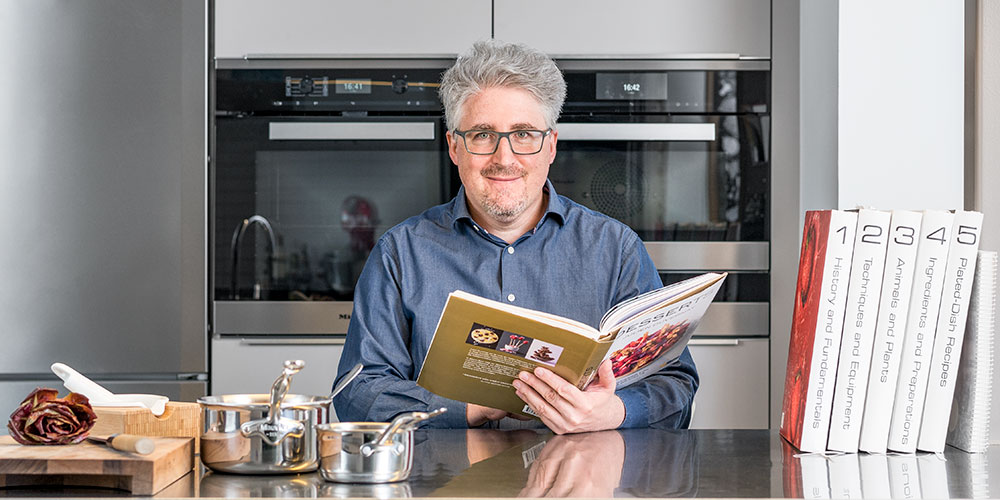Science meets the culinary arts.
Text: Michael Podvinec
My book: Molecular biologist Michael Podvinec recommends two favorite books from his cookbook collection.
It all started out as a reply to a Twitter message from my colleague at the Biozentrum, who was busy enjoying a culinary renaissance following the restaurant closures in late fall 2020. In a series of tweets, I described some of my favorite books from my own collection of cookbooks, the common thread being the connections between science and cooking. I would like to present two of them here:
The first is Modernist Cuisine: The Art and Science of Cooking, by Nathan Myhrvold, Chris Young and Maxime Bilet. This compendium, published in 2011, is groundbreaking: Within the span of six volumes and 2,500 pages printed in fine-art quality, the authors dissect and illustrate every modern culinary technique in such scrupulous, scientific detail as to transform recipes into laboratory procedures – all with pristine, didactic clarity and exquisite illustrations and photographs. The authors explore traditional and contemporary cooking methods step by step, generally based on recipes in the modernist, or “molecular” style from the 2000s. So, the book is influenced by a style of cooking somewhat past its prime; still, it provides the reader with a huge amount of background information on the scientific processes involved in preparing food. And it will make a better chef of you – or at the very least, a more-informed one.
The second book is Desserts by Julien Duvernay. He is the best pastry chef I know, and he works right here in Basel, on the Bruderholzallee. In the cellar of the restaurant Stucki, Duvernay develops desserts to mirror the menus curated by Michelin-star chef Tanja Grandits, guiding them to their logical conclusions. This book provides readers with insights into the techniques, concepts and, of course, the recipes of this incredibly talented chef. But a word to the wise: If you are planning on recreating any of these recipes yourself, bear in mind that they may take one or two days to complete – and remember that the desserts Duvernay serves at the restaurant are frequently even more complex, combining up to 16 different components on a single plate. This complexity, combined with the need for precision that is both required of and celebrated in the craft, always has me drawing parallels between the art of making pastry and the science of research in the lab.
Michael Podvinec is Head of the Research IT Technology Platform at the University of Basel’s Biozentrum. Research IT advises and supports university research groups and administrative offices in research-specific IT applications. Michael Podvinec holds a doctorate in molecular biology and is a passionate chef who has been known to frequent Michelin-starred kitchens. He has also collaborated with Chef Heiko Antoniewicz on five books exploring the intersections between science and the culinary arts.
More articles in the current issue of UNI NOVA.

